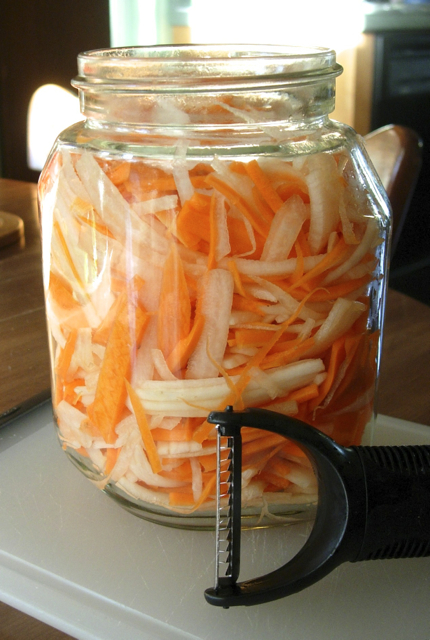
Pickled Carrot and Daikon Radish (Do Chua)
What if I buttonhole you into gathering a few common ingredients and make a simple, soul-filling pickle?
Here is my latest top shelf, all-season pickle that will light up your meals in many delightful ways—any time of year.
A Pickle’s Pickle for Variety
Sandwich Topper
Classic on the Banh Mi Sandwich (see below)
Simple Side Pickle
Salad Topper
Lettuce Wrap and Summer Roll Garnish
Coleslaw Ingredient
Sweet-Sour-Spicy Side Salad (add chile flakes)
Brine + Vegetable Oil into a Salad Dressing
A key tool is the julienne peeler (above) that creates uniform matchsticks of the right thickness for a light pickle crunch. Retails for around $8.00 at most kitchen departments (by Oxo)
RECIPE 1 Quart Recipe (Based on Todd Porter's and Diane Cu's blog)
1/2 pound carrots, julienne cut or match sticks
1/2 pound daikon (icicle radish), julienne cut or match sticks
2 cups filtered water
1 TBS. coarse, sea salt (rounded tablespoon) or 2-1/2 tsp. ground sea salt
1 to 3 TBS. sweetener (add after fermentation is complete)
DIRECTIONS:
Peel carrots and daikon and cut into matchsticks (julienne) and toss together
Load into a clean one-quart jar, lightly packing until about 3 inches from the jar lip
Dissolve salt and water and pour into jar until about a 1/2 inch from jar lip.
Attach the Perfect Pickler® kit using the instruction booklet or watch video
Ferment at around 70 degrees F. for four days. Then remove kit and store pickles in fridge.
ADD SWEETENER
Drain off a half cup of brine from jar and add 1 TBS. sugar and stir to dissolve. Pour back into jar and refrigerate 24 hours. Taste and adjust if needed for a light sweetness.
You are ready for your all season pickle!
For a delicious Asian coleslaw try Mark Bittman's version from the NY Times
______________________________________________
Science
The Skinny on Probiotics: Pickles may be a factor in preventing obesity
Discoveries in probiotic research is expanding exponentially, causing wholesale updates to how we care for ourselves. In this recent Chicago Tribune article you will begin to connect the dots these living cultures present to the tuned reader.
In the following excerpt from the Chicago Tribune
Probiotics May be a Factor in Preventing Obesity
By the editors of Environmental Nutrition, Environmental Nutrition Newsletter Premium Health News Service, October 10, 2012
Accumulating research indicates microbiota in lean individuals is different from that of obese people; lean people tend to have a higher proportion of two types of beneficial bacteria, Bacteroidetes and Firmicutes, than obese people.
Emerging evidence also indicates that probiotics--live microorganisms that boost healthy gut bacteria populations-- provide many health benefits, including enhanced immune response and mitigation of gastrointestinal conditions like diarrhea and irritable bowel syndrome and may factor in obesity prevention.
SCIENCE ON "SKINNY" BUGS
There are "roughly" 100 trillion bacteria in the average person's gastrointestinal tract comprising more than 500 species.
Collectively called gut microbiota, they are influenced throughout your lifetime by your genetics, environment, diet, and immune system. In a 2010 study published in the European Journal of Clinical Nutrition, the probiotic Lactobacillus gasseri SBT2055 was found to lower abdominal fat and body weight in adult subjects with tendencies to become obese.
In another study, of post-operative weight loss surgery patients, researchers found greater weight loss among those who took daily Lactobacillus acidophilus probiotics (Journal of Gastrointestinal Surgery, July 2009.) And studies have found that probiotics showed positive results in suppressing or reducing body weight in rats (Bioscience, Biotechnology, and Biochemistry, 2010, Obesity Research and Clinical Practice, 2008.)
More research is needed to explain why probiotics and gut bacteria influence weight, but one theory is that the gut microbiota profile of obese people shows a propensity for absorbing more calories from foods. When you digest food, your body generally does not absorb 100 percent of the calories from the food, but preliminary research indicates that different balances of gut microbiota may alter the rate of calorie absorption during digestion.
PROBIOTICS ARE UNIQUE
Researchers are just scratching the surface on the importance of gut microbiota for optimal health--including obesity. For now, the key to a healthy weight still is through healthy diet and physical activity. However, many benefits are linked with a favorable balance of healthy gut bacteria. This can be fostered by consuming foods that feed healthy bacteria, such as high-fiber plant foods (whole grains, legumes, fruits, vegetables, nuts and seeds,) and taking probiotics according to package directions. Copyright © 2012, Tribune Media Services
© 2012, Bill Hettig
